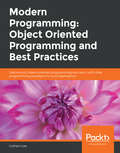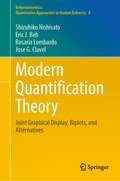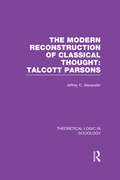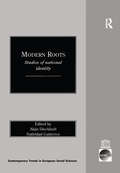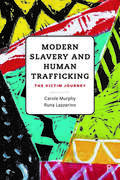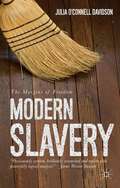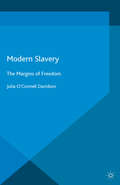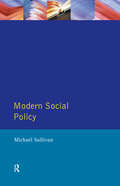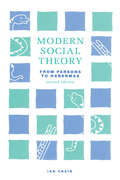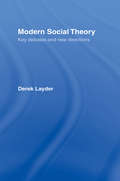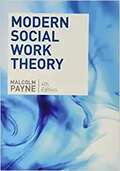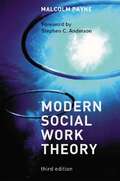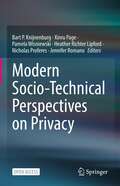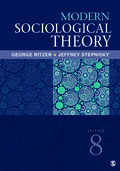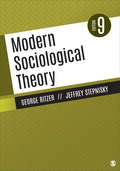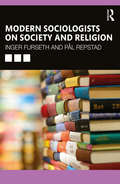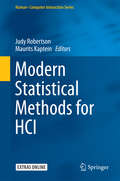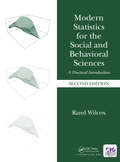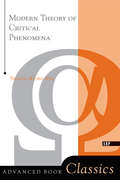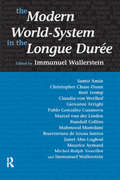- Table View
- List View
Modern Programming: Deconstruct object-oriented programming and use it with other programming paradigms to build applications
by Graham LeeDiscover the untapped features of object-oriented programming and use it with other software tools to code fast, efficient applications. Key Features Explore the complexities of object-oriented programming (OOP) Discover what OOP can do for you Learn to use the key tools and software engineering practices to support your own programming needs Book Description Your experience and knowledge always influence the approach you take and the tools you use to write your programs. With a sound understanding of how to approach your goal and what software paradigms to use, you can create high-performing applications quickly and efficiently. In this two-part book, you'll discover the untapped features of object-oriented programming and use it with other software tools to code fast and efficient applications. The first part of the book begins with a discussion on how OOP is used today and moves on to analyze the ideas and problems that OOP doesn't address. It continues by deconstructing the complexity of OOP, showing you its fundamentally simple core. You'll see that, by using the distinctive elements of OOP, you can learn to build your applications more easily. The next part of this book talks about acquiring the skills to become a better programmer. You'll get an overview of how various tools, such as version control and build management, help make your life easier. This book also discusses the pros and cons of other programming paradigms, such as aspect-oriented programming and functional programming, and helps to select the correct approach for your projects. It ends by talking about the philosophy behind designing software and what it means to be a "good" developer. By the end of this two-part book, you will have learned that OOP is not always complex, and you will know how you can evolve into a better programmer by learning about ethics, teamwork, and documentation. What you will learn Untangle the complexity of object-oriented programming by breaking it down to its essential building blocks Realize the full potential of OOP to design efficient, maintainable programs Utilize coding best practices, including TDD, pair programming and code reviews, to improve your work Use tools, such as source control and IDEs, to work more efficiently Learn how to most productively work with other developers Build your own software development philosophy Who this book is for This book is ideal for programmers who want to understand the philosophy behind creating software and what it means to be “good” at designing software. Programmers who want to deconstruct the OOP paradigm and see how it can be reconstructed in a clear, straightforward way will also find this book useful. To understand the ideas expressed in this book, you must be an experienced programmer who wants to evolve their practice.
Modern Quantification Theory: Joint Graphical Display, Biplots, and Alternatives (Behaviormetrics: Quantitative Approaches to Human Behavior #8)
by Eric J. Beh Rosaria Lombardo Shizuhiko Nishisato Jose G. ClavelThis book offers a new look at well-established quantification theory for categorical data, referred to by such names as correspondence analysis, dual scaling, optimal scaling, and homogeneity analysis. These multiple identities are a consequence of its large number of properties that allow one to analyze and visualize the strength of variable association in an optimal solution. The book contains modern quantification theory for analyzing the association between two and more categorical variables in a variety of applicative frameworks. Visualization has attracted much attention over the past decades and given rise to controversial opinions. One may consider variations of plotting systems used in the construction of the classic correspondence plot, the biplot, the Carroll-Green-Schaffer scaling, or a new approach in doubled multidimensional space as presented in the book. There are even arguments for no visualization at all. The purpose of this book therefore is to shed new light on time-honored graphical procedures with critical reviews, new ideas, and future directions as alternatives. This stimulating volume is written with fresh new ideas from the traditional framework and the contemporary points of view. It thus offers readers a deep understanding of the ever-evolving nature of quantification theory and its practice. Part I starts with illustrating contingency table analysis with traditional joint graphical displays (symmetric, non-symmetric) and the CGS scaling and then explores logically correct graphs in doubled Euclidean space for both row and column variables. Part II covers a variety of mathematical approaches to the biplot strategy in graphing a data structure, providing a useful source for this modern approach to graphical display. Part II is also concerned with a number of alternative approaches to the joint graphical display such as bimodal cluster analysis and other statistical problems relevant to quantification theory.
Modern Reconstruction of Classical Thought: Talcott Parsons (Theoretical Logic in Sociology)
by Jeffrey C. AlexanderIn this volume the author maintains that sociology must learn to combine the insights of both Durkheim and Marx and that it can only do so on the presuppositional ground that Weber set forth. Alexander maintains that the idealist and materialist traditions must be transformed into analytic dimensions of multidimensional and synthetic theory. This volume focusses on the writing of Talcott Parsons, the only modern thinker who can be considered a true peer of the classical founders, and examines his own profoundly ambivalent attempt to carry out this analytic transformation.
Modern Romance
by Eric Klinenberg Aziz AnsariAt some point, every one of us embarks on a journey to find love. We meet people, date, get into and out of relationships, all with the hope of finding someone with whom we share a deep connection. This seems standard now, but it’s wildly different from what people did even just decades ago. Single people today have more romantic options than at any point in human history. With technology, our abilities to connect with and sort through these options are staggering. So why are so many people frustrated? <p><p> Some of our problems are unique to our time. “Why did this guy just text me an emoji of a pizza?” “Should I go out with this girl even though she listed Combos as one of her favorite snack foods? Combos?!” “My girlfriend just got a message from some dude named Nathan. Who’s Nathan? Did he just send her a photo of his penis? Should I check just to be sure?” But the transformation of our romantic lives can’t be explained by technology alone. In a short period of time, the whole culture of finding love has changed dramatically. A few decades ago, people would find a decent person who lived in their neighborhood. Their families would meet and, after deciding neither party seemed like a murderer, they would get married and soon have a kid, all by the time they were twenty-four. Today, people marry later than ever and spend years of their lives on a quest to find the perfect person, a soul mate. <p> For years, Aziz Ansari has been aiming his comic insight at modern romance, but for Modern Romance, the book, he decided he needed to take things to another level. He teamed up with NYU sociologist Eric Klinenberg and designed a massive research project, including hundreds of interviews and focus groups conducted everywhere from Tokyo to Buenos Aires to Wichita. They analyzed behavioral data and surveys and created their own online research forum on Reddit, which drew thousands of messages. They enlisted the world’s leading social scientists, including Andrew Cherlin, Eli Finkel, Helen Fisher, Sheena Iyengar, Barry Schwartz, Sherry Turkle, and Robb Willer. The result is unlike any social science or humor book we’ve seen before. <p> In Modern Romance, Ansari combines his irreverent humor with cutting-edge social science to give us an unforgettable tour of our new romantic world.From the Hardcover edition.
Modern Roots: Studies of National Identity (In association with ICCR Contemporary Trends in European Social Sciences)
by Alain Dieckhoff Natividad GutiérrezInterest in the study of national identity as a collective phenomenon is a growing concern among the social and political sciences. This book addresses the scholarly interest in examining the origins of ideologies and social practices that give historical meaning, cohesion and uniqueness to modern national communities. It focuses on the various routes taken towards the construction of cultural authenticity as an inspirational purpose of nation-building and reveals the diversity of the themes, practices and symbols used to encourage self-identification and communality. Among the techniques explored are the dramatization of suffering and tragedy, the exaltation of heroes and deeds, the evocation of landscape, nature and the arts and the delimitation of collective values to be pursued during reconstruction in post-war periods.
Modern Slavery and Human Trafficking: The Victim Journey
by Carole Murphy and Runa LazzarinoWith a foreword by Patricia HynesThroughout the world, vulnerable people are being deceived into entering abusive journeys. Whether in the organ trade, exploitative labour businesses or forced criminality, their lives will never be the same. This book traces the journey of victims/survivors of modern slavery and human trafficking into and within the UK, from recruitment to representation to (re)integration. Using global comparative case studies, it discusses recruitment tactics and demand, prevention in supply chains, issues with effective legal protection and care services and vulnerability to re-trafficking. It also examines the ideological misrepresentation of vulnerable migrants and victims/survivors in media, the film industry, legislation and more. Rooted in diverse practitioner experience, disciplines and empirical research, this book bridges the experience-research-practice-policy gap by bringing to the fore survivors’ voices. In doing so, it offers crucial suggestions for better public awareness, policies and practices that will impact interventions in the UK and beyond.
Modern Slavery: The Margins of Freedom
by Julia O'Connell DavidsonProviding a unique critical perspective to debates on slavery, this book brings the literature on transatlantic slavery into dialogue with research on informal sector labour, child labour, migration, debt, prisoners, and sex work in the contemporary world in order to challenge popular and policy discourse on modern slavery.
Modern Social Policy: Modern Social Policy In Western Society (Harvester Wheatsheaf Studies In Sociology Ser.)
by Michael SullivanFirst published in 1994. Routledge is an imprint of Taylor & Francis, an informa company.
Modern Social Theory
by Ian CraibThe revised edition of this widely acclaimed textbook provides a clear, accessible and comprehensive introduction to modern social theory.As with the first edition, the book is based around the themes of structure and action. After the introductory chapters which examine the nature of theory and its role in the social world, the book then turns to theories of action and the inability of those theories to comprehend social structures in a coherent way.Part 1 covers: Parson's structural-functionalism and the development of conlict theory and neofunctionalism; rational choice theory; symbolic interactionism; ethnomethodology and structuration theory.Part 2 looks at structuralism, structuralist Marxism, and the development of post-structuralist and postmodernist theory.Part 3 examines Critical Theory and the work of Jurgen Habermas.In conclusion, Ian Craib discusses current trends in theory and what might be expected in the future.This second edition has been revised throughout. There are new chapters on rational choice theory and structuration theory and existing chapters have been extended to deal with the development of neofunctionalism, postmodernism and the recent works of Habermas as well as recent developments in other approaches.Throughout, the aim of the book is to demystify a diffcult subject area, emphasising the practical and everyday nature of theoretical thinking in the context of making sense of a rapidly changing world. The late Ian Craib was Lecturer in Sociology at the University of Essex.
Modern Social Theory: Key Debates And New Directions
by Derek Layder Dr Derek LayderThis book is intended for undergraduate courses in social theory for second and third year sociology students, as well as postgraduate and academic researchers. Secondary markets include social psychology, social geography, social anthopology, cultural studies.
Modern Social Work Theory
by Malcolm PayneThis masterly text is a classic in its field and will be a reliable companion throughout the course of your studies and your career as a social work practitioner. In this substantially reworked and updated fourth edition of his best-selling text, Malcolm Payne presents clear and concise evaluations of the pros and cons of major theories that inform social work practice, and comparisons between them. <p><p> Modern Social Work Theory is now more accessible and comprehensive than ever, offering: the most complete coverage of social work theory, from classic perspectives to the very latest ideas, including a new chapter dedicated to strengths, narrative, and solutions approaches; a host of brand new case examples showing how theories can be applied to everyday practice; new analysis of the ethical dimensions of different social work theories and what common values they share; Pause and Reflect questions to encourage you to draw on your own experience and develop your thinking; and updated Example text sections which summarize the most current thinking and help bridge the gap between introductions to each theory and more specialist writing.
Modern Social Work Theory 3e
by Malcolm PayneAn extensive review of one of the most admired books on social work theory, Malcolm Payne has substantially reworked the content as well as the organization of this important theory book in response to the suggestions of academics and practitioners, while retaining the clarity and critical analysis of the previous edition. Used in practice and human behavior courses around the world, this valuable text is still the only one of its kind.
Modern Socio-Technical Perspectives on Privacy
by Nicholas Proferes Bart P. Knijnenburg Xinru Page Pamela Wisniewski Heather Richter Lipford Jennifer RomanoThis open access book provides researchers and professionals with a foundational understanding of online privacy as well as insight into the socio-technical privacy issues that are most pertinent to modern information systems, covering several modern topics (e.g., privacy in social media, IoT) and underexplored areas (e.g., privacy accessibility, privacy for vulnerable populations, cross-cultural privacy). The book is structured in four parts, which follow after an introduction to privacy on both a technical and social level: Privacy Theory and Methods covers a range of theoretical lenses through which one can view the concept of privacy. The chapters in this part relate to modern privacy phenomena, thus emphasizing its relevance to our digital, networked lives. Next, Domains covers a number of areas in which privacy concerns and implications are particularly salient, including among others social media, healthcare, smart cities, wearable IT, and trackers. The Audiences section then highlights audiences that have traditionally been ignored when creating privacy-preserving experiences: people from other (non-Western) cultures, people with accessibility needs, adolescents, and people who are underrepresented in terms of their race, class, gender or sexual identity, religion or some combination. Finally, the chapters in Moving Forward outline approaches to privacy that move beyond one-size-fits-all solutions, explore ethical considerations, and describe the regulatory landscape that governs privacy through laws and policies. Perhaps even more so than the other chapters in this book, these chapters are forward-looking by using current personalized, ethical and legal approaches as a starting point for re-conceptualizations of privacy to serve the modern technological landscape. The book’s primary goal is to inform IT students, researchers, and professionals about both the fundamentals of online privacy and the issues that are most pertinent to modern information systems. Lecturers or teachers can assign (parts of) the book for a “professional issues” course. IT professionals may select chapters covering domains and audiences relevant to their field of work, as well as the Moving Forward chapters that cover ethical and legal aspects. Academics who are interested in studying privacy or privacy-related topics will find a broad introduction in both technical and social aspects.
Modern Sociological Theory
by Dr George Ritzer Mr Jeffrey N. StepniskyNow with SAGE Publishing, and co-authored by one of the foremost authorities on sociological theory, the Eighth Edition of Modern Sociological Theory by George Ritzer and Jeffrey Stepnisky provides a comprehensive overview of the major theorists and theoretical schools, from the Structural Functionalism of early 20th century through the cutting-edge theories of the late 20th and early 21st centuries. The integration of key theories with biographical sketches of theorists and the requisite historical and intellectual context helps students to better understand the original works of contemporary thinkers. New to this Edition A new chapter focuses theories of race, racism, and colonialism, as well as theories about indigenous peoples and theories from the “Global South” that challenge the work of scholars from Europe and North America. New material on colonialization, classical women theorists, and race, as well as new timelines in history chapters. The chapter on Symbolic Interactionism now discusses work on the sociology of emotions. The concluding chapter now discusses affect theory and theories of prosumption, one of the newest developments in consumer theory. The chapter on Contemporary Theories of Modernity includes new section on the work of Charles Taylor. New perspectives on the work of Immanuel Wallerstein have been added to the chapter on Neo-Marxian theories. The opening historical sketch chapters now include a discussion of colonialism as one of the forces that shaped modern society; new material on the historical significance of early women founders; and a section on theories of race.
Modern Sociological Theory
by George Ritzer Jeffrey N. StepniskyThe authors are proud sponsors of the SAGE Keith Roberts Teaching Innovations Award—enabling graduate students and early career faculty to attend the annual ASA pre-conference teaching and learning workshop. Modern Sociological Theory gives readers a comprehensive overview of the major theorists and schools of sociological thought, from sociology′s 19th century origins through the mid-20th century. Written by an author team that includes one of the leading contemporary thinkers, the text integrates key theories with with biographical sketches of theorists, placing them in historical and intellectual context.
Modern Sociological Theory
by George Ritzer Jeffrey N. StepniskyThe authors are proud sponsors of the SAGE Keith Roberts Teaching Innovations Award—enabling graduate students and early career faculty to attend the annual ASA pre-conference teaching and learning workshop. Modern Sociological Theory gives readers a comprehensive overview of the major theorists and schools of sociological thought, from sociology′s 19th century origins through the mid-20th century. Written by an author team that includes one of the leading contemporary thinkers, the text integrates key theories with with biographical sketches of theorists, placing them in historical and intellectual context.
Modern Sociological Theory (Mcgraw-hill International Editions)
by Dr George Ritzer Mr Jeffrey N. StepniskyNow with SAGE Publishing, and co-authored by one of the foremost authorities on sociological theory, the Eighth Edition of Modern Sociological Theory by George Ritzer and Jeffrey Stepnisky provides a comprehensive overview of the major theorists and theoretical schools, from the Structural Functionalism of early 20th century through the cutting-edge theories of the late 20th and early 21st centuries. The integration of key theories with biographical sketches of theorists and the requisite historical and intellectual context helps students to better understand the original works of contemporary thinkers. New to this Edition A new chapter focuses theories of race, racism, and colonialism, as well as theories about indigenous peoples and theories from the “Global South” that challenge the work of scholars from Europe and North America. New material on colonialization, classical women theorists, and race, as well as new timelines in history chapters. The chapter on Symbolic Interactionism now discusses work on the sociology of emotions. The concluding chapter now discusses affect theory and theories of prosumption, one of the newest developments in consumer theory. The chapter on Contemporary Theories of Modernity includes new section on the work of Charles Taylor. New perspectives on the work of Immanuel Wallerstein have been added to the chapter on Neo-Marxian theories. The opening historical sketch chapters now include a discussion of colonialism as one of the forces that shaped modern society; new material on the historical significance of early women founders; and a section on theories of race.
Modern Sociologists on Society and Religion
by Inger Furseth Pål RepstadModern Sociologists on Society and Religion provides an introduction to some of the most influential figures in contemporary social theory with an emphasis on their analyses of society and religion. The figures profiled include Erving Goffman, Zygmunt Bauman, Michel Foucault, Peter L. Berger, Thomas Luckmann, Jürgen Habermas, Pierre Bourdieu, Anthony Giddens, Arlie Hochschild, Richard Sennett, and Patricia Hill Collins. The introduction places these sociologists in contemporary social discourse. Each chapter begins with an introduction to the main work and social analyses of the sociologist in question. After a brief critical assessment, it outlines their view on religion, followed by examples of how other sociologists have used their theories to study religion. Each chapter ends with the authors’ suggestions for how their perspectives can be used to analyze the role of religion in contemporary society. The book provides a general introduction and overview of social analyses in modern sociology. It is a rich resource for scholars and students on all levels who are interested in social theory and the complexity of religion in contemporary society.
Modern South Asia: History, Culture, Political Economy
by Ayesha Jalal Sugata Bose<P>Drawing on the newest and most sophisticated historical research and scholarship in the field, Modern South Asia provides a challenging insight for those with an intellectual curiosity about the region.<P> After sketching the pre-modern history of the subcontinent, the book concentrates on the last three centuries.<P> Jointly authored by two leading Indian and Pakistani historians, it offers a rare depth of historical understanding of the politics, cultures, and economies that shape the lives of more than a fifth of humanity.
Modern Statistical Methods for HCI
by Judy Robertson Maurits KapteinThisbook critically reflects on current statistical methods used in Human-ComputerInteraction (HCI) and introduces a number of novel methods to the reader. Coveringmany techniques and approaches for exploratory data analysis including effectand power calculations, experimental design, event history analysis,non-parametric testing and Bayesian inference; the research contained in thisbook discusses how to communicate statistical results fairly, as well aspresenting a general set of recommendations for authors and reviewers toimprove the quality of statistical analysis in HCI. Each chapter presents [R]code for running analyses on HCI examples and explains how the results can beinterpreted. ModernStatistical Methods for HCI is aimed at researchers and graduate students who have someknowledge of "traditional" null hypothesis significance testing, but who wishto improve their practice by using techniques which have recently emerged fromstatistics and related fields. This book critically evaluates current practiceswithin the field and supports a less rigid, procedural view of statistics infavour of fair statistical communication.
Modern Statistics for the Social and Behavioral Sciences: A Practical Introduction (Second Edition)
by Rand Wilcox<p>Requiring no prior training, Modern Statistics for the Social and Behavioral Sciences provides a two-semester, graduate-level introduction to basic statistical techniques that takes into account recent advances and insights that are typically ignored in an introductory course. <p>Hundreds of journal articles make it clear that basic techniques, routinely taught and used, can perform poorly when dealing with skewed distributions, outliers, heteroscedasticity (unequal variances) and curvature. Methods for dealing with these concerns have been derived and can provide a deeper, more accurate and more nuanced understanding of data. A conceptual basis is provided for understanding when and why standard methods can have poor power and yield misleading measures of effect size. Modern techniques for dealing with known concerns are described and illustrated. <p>Features: <p> <li>Presents an in-depth description of both classic and modern methods <li>Explains and illustrates why recent advances can provide more power and a deeper understanding of data <li>Provides numerous illustrations using the software R <li>Includes an R package with over 1300 functions <li>Includes a solution manual giving detailed answers to all of the exercises</li> <p> <p>This second edition describes many recent advances relevant to basic techniques. For example, a vast array of new and improved methods is now available for dealing with regression, including substantially improved ANCOVA techniques. The coverage of multiple comparison procedures has been expanded and new ANOVA techniques are described.</p>
Modern Theory Of Critical Phenomena
by Shang-keng MaAn important contributor to our current understanding of critical phenomena, Ma introduces the beginner--especially the graduate student with no previous knowledge of the subject-to fundamental theoretical concepts such as mean field theory, the scaling hypothesis, and the renormalization group. He then goes on to apply the renormalization group to selected problems, with emphasis on the underlying physics and the basic assumptions involved.
Modern Vintage Homes & Leisure Lives
by Samantha HollandThis book explores the meanings and practices of vintage lives. It focuses on the non-mainstream subculture of vintage clothes and lifestyle, specifically that of the 1940s, 1950s and 1960s, and asks how those engaged in the culture place themselves within the gendered and classed contexts of these eras. As a result, it also identifies the tensions involved in these identities connected to a past that offered little gain for women and narrow gender roles for both women and men. Modern Vintage Homes & Leisure Lives is based on original empirical international data about a group of people who wear vintage clothing all of the time and whose homes are styled entirely, or almost entirely, vintage. It aims to understand the meanings of vintage for them through their daily practices and accrued knowledge. Through interviews and direct observations of vintage events it also explores questions about the acquisition, display and curation of vintage clothes, homes and objects, about glamour and wardrobes, about the history of second-hand markets, and emotional durability and ideas about ghosts, hauntings and spectral remains. It will be of particular interest to students and academics of gender and women's studies, fashion and design, fashion history, cultural studies, the body and embodiment.
Modern World-System in the Longue Duree
by Immanuel WallersteinIn this book prominent scholars from around the world debate two major themes: the past and future of the capitalist world-economy, and the ways in which a capitalist economy shapes Western research, the academy, and broader knowledge structures. Putting the two themes together, they also analyze the relationship between scholarship and the rest of the world. The book is published to commemorate the 25th anniversary of the Fernand Braudel Center. Contributors Samir Amin, Christopher Chase-Dunn, Bart Tromp,. Claudia von Werlhof, Giovanni Arrighi, Pablo Gonzalez-Casanova, Marcel van der Linden, Randall Collins, Mahm ood Mamdani, Boaventura de Sousa Santos, Michel-Rolph Trouillot, Janet Abu-Lughod, Maurice Aymard, and Immanuel Wallerstein.
